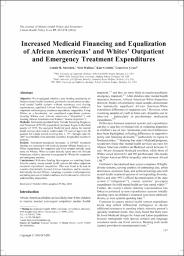
ATTENTION: The works hosted here are being migrated to a new repository that will consolidate resources, improve discoverability, and better show UTA's research impact on the global community. We will update authors as the migration progresses. Please see MavMatrix for more information.
Show simple item record
| dc.contributor.author | Snowden, Lonnie R. | |
| dc.contributor.author | Wallace, Neal | |
| dc.contributor.author | Cordell, Kate | |
| dc.contributor.author | Graaf, Genevieve | |
| dc.date.accessioned | 2019-07-08T17:24:39Z | |
| dc.date.available | 2019-07-08T17:24:39Z | |
| dc.date.issued | 2016 | |
| dc.identifier.citation | Snowden, L. R., Wallace, N., Cordell, K., & Graaf, G. (2016). Increased Medicaid financing and equalization of African Americans' and Whites' outpatient and emergency treatment expenditures. The Journal of Mental Health Policy and Economics, 19(3), 167-174. | en_US |
| dc.identifier.uri | http://hdl.handle.net/10106/28285 | |
| dc.description | Copyright 2016 ICMPE
This is the Publisher’s version PDF Obtain permission from ICMPE to make it Open Access. | en_US |
| dc.description.abstract | Objective: We investigated whether a new funding opportunity to finance mental health treatment, provided to autonomous countylevel mental health systems without customary cost sharing requirements, equalized African American and White children’s outpatient and emergency treatment expenditure inequalities. Using Whites as a benchmark, we considered expenditure patterns favoring Whites over African Americans (‘‘disparities’’) and favoring African Americans over Whites (‘‘reverse disparities’’).
Methods: Settlement-mandated Early Periodic Screening Diagnosis and Treatment (EPSDT) expenditure increases began in the third quarter of 1995. We analyzed Medi-Cal paid claims for mental health services delivered to youth (under 18 years of age) over 64 quarters for a study period covering July 1, 1991 through June 30, 2007 in controlled cross-sectional (systems), longitudinal (quarters) analyses.
Results: Settlement-mandated increases in EPSDT treatment funding was associated with relatively greater African American vs. White expenditures for outpatient care when systems initially spent more on Whites. When systems initially spent more on African Americans, relative increases were greater for Whites for outpatient and emergency services.
Conclusions: With new funding that requires no matching funds from the county, county mental health systems did reduce outpatient treatment expenditure inequalities. This was found to be true in counties that initially favored African Americans and in counties that initially favored Whites. Adopting a systems level perspective and taking account of initial conditions and trends can be critical for understanding inequalities. | en_US |
| dc.language.iso | en_US | en_US |
| dc.publisher | International Center of Mental Health Policy and Economics (ICMPE) | en_US |
| dc.relation.ispartofseries | The Journal of Mental Health Policy and Economics; | |
| dc.title | Increased Medicaid Financing and Equalization of African Americans’ and Whites’ Outpatient and Emergency Treatment Expenditures | en_US |
| dc.type | Article | en_US |
Files in this item
- Name:
- 19-167_text.pdf
- Size:
- 87.52Kb
- Format:
- PDF
- Description:
- PDF
This item appears in the following Collection(s)
Show simple item record


